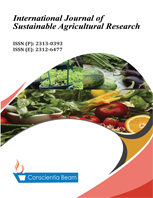Assessment of Potassium Leaching Behaviour in Selected Soils of Southeastern Nigeria
DOI:
https://doi.org/10.18488/journal.70.2018.51.10.18Abstract
This study was conducted to asses Potassium leaching behavior of six (6) selected parent materials in Eastern Nigeria. The soils were formed from Shale, Coastal Plain Sand, Alluvium, Sandstone, Basement Complex and Basalt. A treatment solution containing O, 50, 100, 150 and 200mg/l of K prepared from KCl were added to 20g of soil samples in duplicated cups, the upper cup perforated, mixed thoroughly and allowed to dry. The cups were carefully covered and allowed to incubate for 1, 7, 30, 90 and 180 days, respectively. A total of 180 experimental units were generated and the treatment combinations were fitted into a Randomized Complete Block Design (RCBD), with 6 soil types representing the blocks for each of the incubation periods. The soil samples were kept moist with deionized water at weekly interval throughout the duration of incubation. At the set days, the concentrations of K in the leachate were measured using flame photometry. The K concentrations with days of incubation were plotted against rates of addition. The result shows that the leaching behavior of K in the parent materials varies under similar experimental conditions. Coastal Plain Sand, Sandstone and Basaltic Soil with high sand content exhibits highest amount of leaching compared to shale, alluvium and basement complex with high clay content. A higher K losses with high rates of K addition was observed and K decreased with time (days) of incubation.

